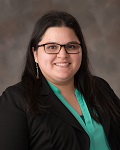2022
Margaret Huettl
- Assistant Professor
- University of Nebraska-Lincoln

Abstract
New Storytellers: The Research Institute in Digital Ethnic Studies, a two-week immersive workshop, brings together scholars from Minority Serving Institutions (MSIs), faculty and staff at the University of Nebraska, and guest presenters from other universities who collectively are deeply invested in using digital technologies to explore race, ethnicity, and social justice. New Storytellers intervenes in the field of digital humanities by broadening the participation and inclusion of underrepresented groups, bringing their voices into the conversation and engaging them with computational and new media tools to expand, recalibrate, and extend the impact of interdisciplinary work on race and ethnicity. The team’s experience gained through nearly fifteen years of hosting the Nebraska Forum on Digital Humanities, nearly five decades of research and teaching in Nebraska's Institute for Ethnic Studies, and extensive engagement with faculty members at minority-serving institutions informs the approach.
Abstract
This project is an Anishinaabe or Ojibwe history of Gichigami (Lake Superior). Stretching from time immemorial to the present day, this history explores seven episodes in Gichigami’s past, present, and future, bringing together environmental, cultural, and political histories. From an Anishinaabe perspective, the history of Gichigami is one of their unbroken relationship with the lake and its resources, a powerful story of sovereignty amidst settler colonial destruction. Anishinaabe men and women claimed and reclaimed Gichigami through legal activism, everyday labor, and sacred relationships. An Anishinaabe history of Gichigami demonstrates that the largest of the Great Lakes remained an Anishinaabe space—and that has implications for thinking about solutions to contemporary problems such as climate change.

